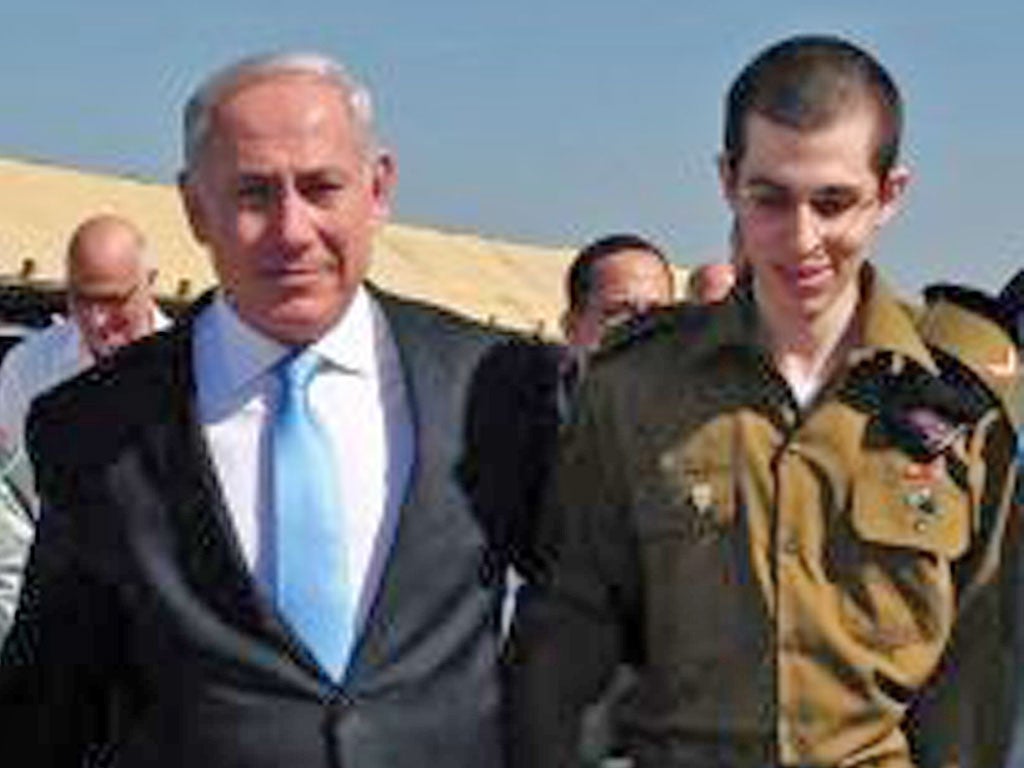'I didn't listen': How ignoring briefing and disobeying order saved the life of Gilad Shalit, the Israeli soldier captured by Hamas
Sergeant held for five years by Hamas reveals how he was taken captive after attack

Gilad Shalit, the Israeli soldier captured by Hamas operatives in 2006, missed an opportunity to shoot his kidnappers and failed to call for backup, it has been revealed.
Mr Shalit, a sergeant in a tank division posted to patrol the border between Gaza and Israel, made no attempt to escape when he was kidnapped and admitted ignoring security briefings before his deployment according to interviews with army investigators published in the Jerusalem Post offering the first detailed accounts of Mr Shalit’s capture and the five years he was subsequently held in captivity in Gaza.
The interviews, conducted after his release in October 2011 in a prisoner swap deal also, in part, demonstrate a failure of intelligence and a lack of preparedness ahead of the kidnap.
Against orders, three of the four members of the group inside Mr Shalit’s tank were asleep just before 5am on 25 June 2006, when a rocket propelled grenade hit the tank. In the confusion, Mr Shalit was ordered to leave the tank by his commanding officer, Lt Hanan Barak, though the order was against army regulations. Mr Shalit, who was regarded by the Israel Defence Forces (IDF) as someone who lacked initiative, refused.
Ignoring the order to leave probably saved Mr Shalit’s life; both Lt Barak, and another soldier, St-Sgt Pavel Slutzker were killed as they left. After his release, Mr Shalit said he did not leave “because the tank seemed safer than there, outside.”
The two militants attacking Mr Shalit’s tank were part of a team of seven who had breached the fence separating Gaza from Israel. In the past it has been suggested that the raid had the specific intention of capturing a soldier, but it appears that Mr Shalit would almost certainly have died had he not hung his bulletproof vest over the back of his seat inside the tank.
The militants lobbed three hand grenades into the tank, with the vest absorbing the worst of the blasts. It was only the smoke that forced Mr Shalit out, where he saw one of the militants climbing onto the tank.
“You never thought to shoot the terrorist?” Mr Shalit was asked during the investigation. “No,” he answered. “I was completely confused. I did not think about anything. I was in shock.” The attacker noticed Mr Shalit when he began shouting “don’t shoot, don’t shoot” in Hebrew.
Despite other units being stationed close by, Mr Shalit did not call for support. He later admitted he had not been paying attention during a briefing ahead of his deployment. “I didn’t listen,” he told investigators. “The commander was listening, and that was enough. I trusted him.”
It was that moment that began Mr Shalit’s 1,934 days in captivity in the Palestinian territories at the hands of Hamas militants. Despite “annoyances” in the early days, he was reasonably well treated, and was even allowed to watch the 2010 World Cup.
Mr Shalit was eventually released in 2011 in exchange for 1,027 Palestinian prisoners freed. He has since become a sports journalist.
Subscribe to Independent Premium to bookmark this article
Want to bookmark your favourite articles and stories to read or reference later? Start your Independent Premium subscription today.

Join our commenting forum
Join thought-provoking conversations, follow other Independent readers and see their replies